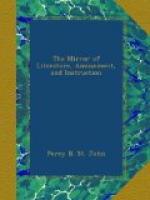The style of Bunyan is delightful to every reader, and invaluable as a study to every person who wishes to obtain a wide command over the English language. The vocabulary is the vocabulary of the common people. There is not an expression, if we except a few technical terms of theology, which would puzzle the rudest peasant. We have observed several pages which do not contain a single word of more than two syllables. Yet no writer has said more exactly what he meant to say. For magnificence, for pathos, for vehement exhortation, for subtle disquisition, for every purpose of the poet, the orator, and the divine, this homely dialect—the dialect of plain working men—was perfectly sufficient. There is no book in our literature on which we would so readily stake the fame of the old unpolluted English language—no book which shows so well how rich that language is in its own proper wealth, and how little it has been improved by all that it has borrowed.
Cowper said, forty or fifty years ago, that he dared not name John Bunyan in his verse, for fear of moving a sneer. To our refined forefathers, we suppose, Lord Roscommon’s Essay on Translated Verse, and the Duke of Buckinghamshire’s Essay on Poetry, appeared to be compositions infinitely superior to the allegory of the preaching tinker. We live in better times; and we are not afraid to say, that, though there were many clever men in England during the latter half of the seventeenth century, there were only two great creative minds. One of those minds produced the Paradise Lost, the other the Pilgrim’s Progress.—Edinburgh Review.
* * * * *
THE GATHERER.
A London publisher advertises a collection of Nursery Tales as a “handsome present for youth.” Here the schoolmaster is surely behind-hand.
* * * * *
IMPROMPTU.—TO A LADY.
(From the Italian.)
Think not thy faults, my pretty
scold,
Like transient clouds will
pass away;
Thine image in the rose behold,
Whose leaves fade ere the
thorns decay.
E.L.J.
This trifle was sent to the Mirror a few days since, and last Saturday it appeared in the Literary Gazette, with the same signature, E.L.J.—Is not this double-dealing?
* * * * *
Pantomimes.—Four hundred persons are nightly employed in the pantomime at Covent Garden Theatre, on the stage, behind the scenes, and in the orchestra. Of this number are 90 carpenters in the machinery, property, and scenic department. The usual cost of one of these relics of olden Christmas at a patent theatre is L2,000.; and upwards of L10,000. are annually expended in producing pantomimes for the amusement of the large and little children of this great metropolis.




